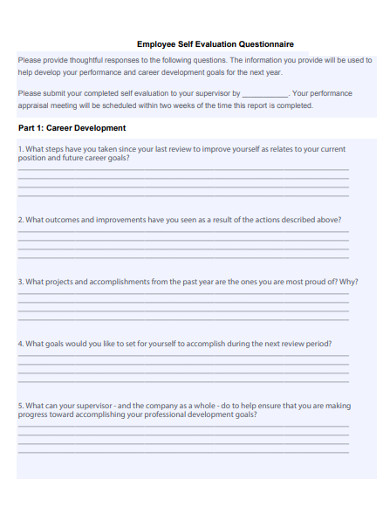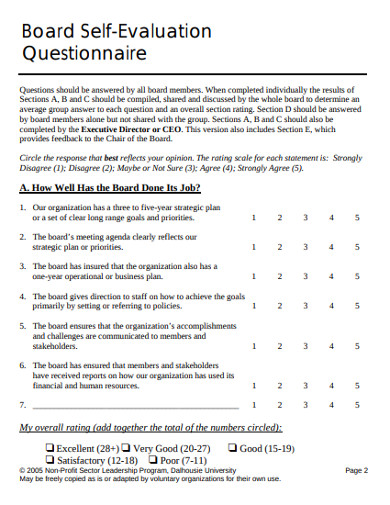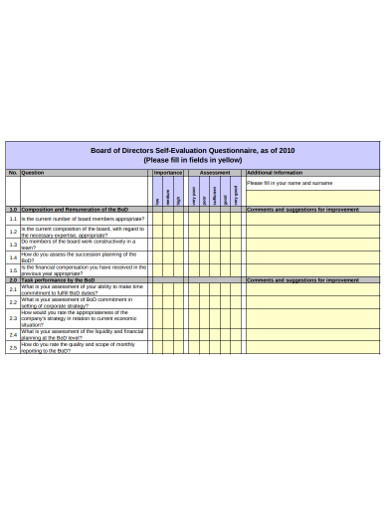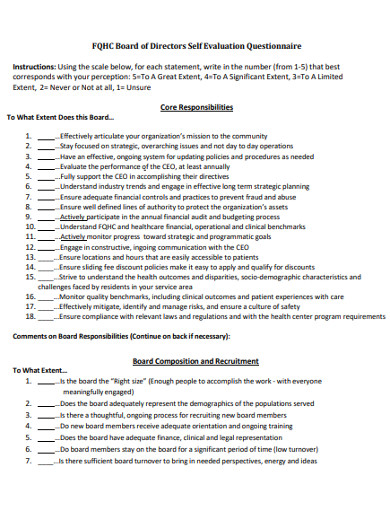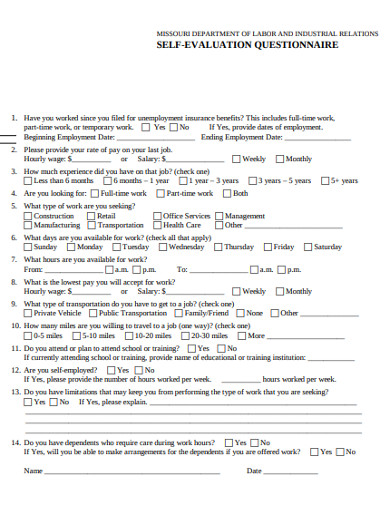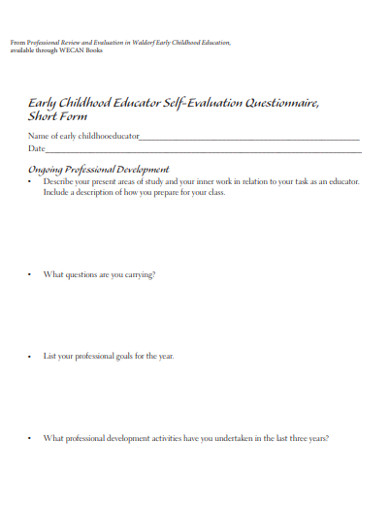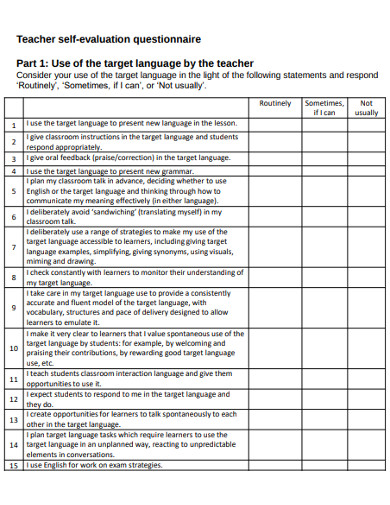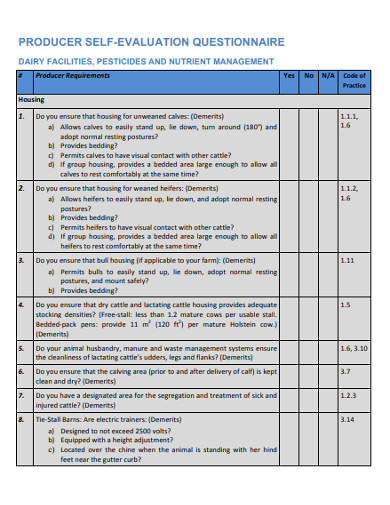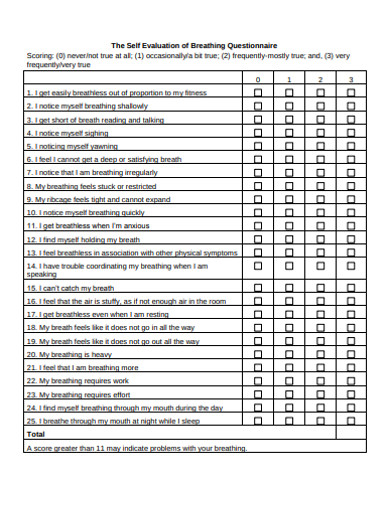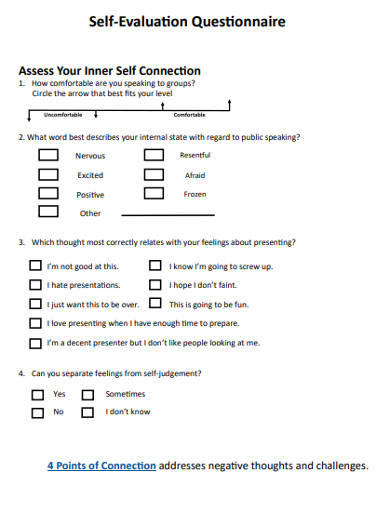10+ Self Evaluation Questionnaire Examples to Download
It is in introspection that we gain moments of clarity and understanding. It is an impetus for change and self-development. Our actions and decisions are influenced by what we value. And reflecting on what we value will affect how we think and act. Self-evaluations fuel personal growth in this manner. Personal growth is primal in pushing the limits of our current capacities, both in our personal lives and careers. In business, self-improvements are climactic for the success of an enterprise.
Self-Evaluation Questionnaire Defined
Self-appraisal questionnaires are an effective supplement in the performance evaluation of an individual or team. The forms function as a reminder of the standard performance the company requires from its employees. Furthermore, employees are apprised of how they are rated and reviewed. Self-evaluation promises that the employees will see the activity as a motivation for personal and professional growth. This is because they know the standard they are expected to live up to. Eventually, their job performance after the evaluation will significantly improve.
Evaluative activities also give the employees the impression that the company values their inputs and accomplishments. It shows them that they can make a meaningful difference. In the modern workforce, employee satisfaction is a resource that companies cannot neglect. When employees are happy and satisfied in their environment, they are more likely to stay in the company. A high employee retention rate is economically beneficial for the company, too. Remember that recruiting new workers costs more than making the present ones stay.
Ethical Productivity
The company has to generate revenue to stay afloat. High productivity means that there are more profitable output for the company and more opportunities for the community. To sustain the numbers, companies are developing criteria and rubrics that measure the employee’s contribution. The maximum output for fewer resources is valued. But when productivity becomes an obsession, the company could be sacrificing the physical, psychological, and mental health of its employees.
You pay a steep price for prioritizing productivity over everything else. Being obsessed with these numbers may negatively impact your employees—leading to burnout and high turnover rates. This practice is not sustainable. Instead, the company should focus on ethical productivity where the employees aren’t treated as replaceable output machines. By honing in on to the voice and thoughts of employees through conducting self-assessments, you obtain valuable input on how everything looks from your employees’ perspective. By making your employees feel that they are doing meaningful work and that their accomplishments are recognized, you are helping foster a healthier workplace environment.
10+ Self Evaluation Questionnaire Examples & Templates
Browse through the following samples and templates of self-evaluation forms and questionnaires.
1. Employee Self Evaluation Questionnaire Example
2. Board Self-Evaluation Questionnaire Example
3. Board of Directors Self-Evaluation Questionnaire Example
4. Board of Directors Self Evaluation Questionnaire Example
5. Basic Self Evaluation Questionnaire Example
6. Childhood Educator Self-Evaluation Questionnaire Example
7. Teacher Self-Evaluation Questionnaire Example
8. Producer Self Evaluation Questionnaire Example
9. Self Evaluation of Breathing Questionnaire Example
10. Standard Self-Evaluation Questionnaire Example
11. Self Evaluation Questionnaire for Chapter Members Examples
Enabling Fruitful Introspection
In contrast with other performance appraisal methods conducted by the HR personnel, self-evaluation questionnaires can be performed in an individual’s own time. What the questionnaires lack in the former’s degree of objectivity, it makes up for its two-way effect on the individual and to the company. The inputs in the evaluation form won’t just be informative to the management. It enables employees to assess themselves on how they performed throughout the month, quarter, or year. Moreover, self-realizations are efficient in delivering a message better than comments and advice. When people realize their job performance and behavior on their own, they are likely to be more proactive in working on themselves. However, this effect will only be achieved if the questionnaires are constructed well. When making the self-evaluation questionnaires, keep in mind that:
1. Questions Shape Answers
The answers will always go back to the questions. So the format, type, and even the words used in the questions decide the kind of answers you will get. Pay attention to the connotation of the words; “immature” sounds negative while “innocent” evokes a positive feeling. Another consideration is the type of questions. People would find it easier to go through survey evaluations that use rating scales, but the answers won’t necessarily be reflective. You can try combining this format with open-ended questions. Even though the latter will take some time, the answers will be insightful for both you and the respondent.
2. Time is a Finite Resource
Before you fill the questionnaire to the brim with open-ended questions, you have to consider if you and the respondents have the time to process the answers. Always take into account the time you spend in preparing for the evaluations. Although shorter survey forms take less time to answer, you would sacrifice a certain richness of answers. Meanwhile, a 25-page survey form will tire people out just by looking at them. Hence, you have to hit the sweet spot between the conciseness of the questionnaire and the value of the answers you get.
3. Questions are Work-Centric
Bear in mind that you are not conducting a personality test. Even though the questionnaires collect the employees’ reflections, the questions should still be about their performance and career. The goal of self-evaluation is to measure their performance based on introspective learning. Therefore, the questions should be relevant and specific to the person’s responsibilities. You can ask about how much the person thinks he or she has fulfilled. You may also add questions on what the person perceives as his or her achievements and professional development at work.
4. Self-Evaluations Are a Safe Space
Self-evaluation questionnaires lose their purpose when the respondents will just give answers they think the management expects from them. It is likely that the employees and the management have different views regarding one’s job performance. Self-assessment should be a non-judgmental process. You would want to encourage authenticity and honesty with the employees in their questionnaires. When within reason and respect, the respondents should not be persecuted for their answers. The differences in the performance review may also call for a calibration on how the institution assesses the members.
Proactive improvement on a personal and professional level is one of the benefits of introspection. You may consider conducting self-evaluations in your company to motivate your employees at work, as well as raise their self-confidence. It is an avenue where employees can communicate their thoughts and have their achievements given value. It will also allow recalibration of your company’s performance metric system that lets the company’s interest and employees’ welfare meet halfway.



